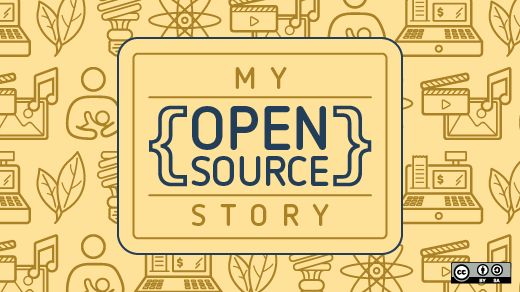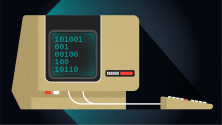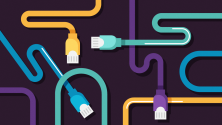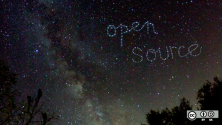Here I am, almost 20 years into my own crazy open source story, and it shows no sign of abating. And my problem is that I like to know how things work and to fix things.
I started fixing TVs, ours and the neighbors', when I was nine or 10. In those days every TV came with a schematic that identified the tube types, and I learned to tell what they did from the schematics. I also bought a little book that had pictures of what the screen looked like with different types of problems and which part of the circuit would contain the defective tube.
I would observe the symptoms, look in my book if it was one I had not seen before, and check the schematic for the tube that performed that function. I would then pull the tube, run down to the drug store or the grocery—both of which had tube testers and sold replacement tubes—and purchase a replacement tube. Fixing TVs was easy.
In my twenties, I started fixing audio equipment for a living. That in itself is a story that might fill a book. But I found that to be easy, too. I migrated to IBM and gained another story too long to tell here. But I found fixing unit record equipment—a fancy name for machines that mangled punched cards—easy, too. And then I moved on to fixing real computers.
While at IBM I managed to get into the IBM PC Company in the dealer support center as a support specialist. I worked for a few years mostly with hardware and applications, but then started supporting operating systems starting when OS/2 came out. Even after leaving IBM, I made a living for a few years as an independent consultant supporting OS/2.
Then it all changed.
For me, getting started in open source was about freedom and education—my own education. I could see that IBM was going to dump OS/2 and I certainly did not want to deal with Windows, nor did I have the money to purchase Windows for all of my computers. I really wanted to learn Unix, which I felt was a real operating system that would offer me plenty of job opportunities.
So while I was working at a large telecommunications company supporting their OS/2 systems, I took classes on Solaris and started playing with a couple small Sun boxes on my desk. I learned a lot and found that I could do things undreamed of in other operating systems.
I wanted to learn more and faster. But without the funds to purchase even a small Sun box and Solaris, I thought I would be unable to do so at home.
One day in 1997 I heard about this operating system with the funny name of Linux. It sounded interesting because it was very Unix-like and I could install it on my Intel computers. In fact, I could obtain a single copy and install it on all of my computers. That was very important to me at the time, because my glacially slow Internet connection would take days to download the CD ISO image file needed to burn my own. I really had to purchase a CD so I would not tie up my connection.
I went to a now-defunct computer chain store and purchased a fairly inexpensive copy of Red Hat Linux 5. Not Fedora 5, or RHEL 5, but the old-timey Red Hat 5.
I took the plunge and installed this Red Hat Linux on my laptop that was, even then, very old. Back in those olden days there was far less support for the wide range of hardware we now take for granted. So I was stuck with running in text mode only. That was actually OK because it gave me the opportunity—forced me, rather—to learn CLI commands. And it hooked me on the command line and the power and control that is intrinsic to that mode of human-computer interaction.
And, because the license allowed me to, I installed Linux on another computer (and then another) without having to purchase another license.
But I was still just dabbling, and my primary workstation was still my trusty OS/2 machine. No, I have never used Windows as a primary operating system on any of my own personal computers.
Ultimately, I decided that the only real way to learn as much as I could about Linux was to get rid of OS/2 completely and install Linux on all of my computers. So about a year after first hearing about Linux, I took the plunge and converted my main workstation and the remaining two of my computers that were still running OS/2 to Red Hat Linux. I have never looked back, and all of my computers have run Linux ever since.
Over the years, hardware support has improved, newer and better applications have become available, and I made a career out of open source. I was a Linux trainer, I wrote Perl CGI scripts on a Linux server, I was a lab administrator, and I tested Linux boxes.
But for me open source software has always been less about the career and more about being free to do what I needed on my own computers. I was just very lucky to be able to transform the knowledge gained through my testing, experimenting, and playing on my home systems, into a well-paying career.
I am now retired, but I never tire of installing new distributions of Linux on various computers that seem to be gifted to me. I enjoy the freedom I have to then give away those computers with GNU/Linux installed and never have to concern myself with the possibility that the license police might show up and give me a legal thrashing.
I have regifted some of those computers, and others were gifted directly to my church. I, and the team I work with there, install and maintain Linux on the majority of those computers; and we are working on ways to move off other operating systems as much as possible. We still use Windows in VMs under VirtualBox in a couple instances where there is no open source alternative (yet) or where we have not convinced one of our church volunteers to try something new.
I still fix things; I fix old computers by installing GNU/Linux and other open source software on them and making them useful again. I sometimes also must repair the hardware when old hardware breaks. So I sit here writing, surrounded by relatively new computers with covers removed, old computers with new parts undergoing tests, various drawers full of replacement parts that might one day soon be needed, and a few boxes partially filled with defective parts of various types—fans, hard drives, motherboards, video cards, memory sticks, and power supplies—that I will soon take to the recycling center near me in North Raleigh.
One of my favorite open source projects is LibreOffice, which I am using to write this article. So, in honor of the fact that I appreciate it so much, I have just donated to the LibreOffice project. It is important to support open source software in order to ensure its continuing development and availability. I encourage you to pick a project you appreciate and donate time and talent or money to support it.







7 Comments